 |
|
Brendan MacLean
Brendan worked at Microsoft for 8 years in the 1990s where he was a lead developer and development manager for the Visual C++/Developer Studio Project. Since leaving Microsoft, Brendan has been the Vice President of Engineering for Westside Corporation, Director of Engineering for BEA Systems, Inc., Sr. Software Engineer at the Fred Hutchinson Cancer Research Center, and a founding partner of LabKey Software. In this last position he was one of the key programmers responsible for the Computational Proteomics Analysis System (CPAS), made significant contributions to the development of X!Tandem and the Trans Proteomic Pipeline, and created the LabKey Enterprise Pipeline. Since August, 2008 he has worked as a Sr. Software Engineer within the MacCoss lab and been responsible for all aspects of design, development and support in creating the Skyline Targeted Proteomics Environment and its growing worldwide user community.
|
 |
|
Michael J. MacCoss, Ph.D.
Mike became interested in biomedical applications of mass spectrometry while working in Dr. Patrick Griffin’s protein mass spectrometry lab at Merck Research Laboratories. He obtained a Ph.D. with Professor Dwight Matthews and pursued a postdoc with Professor John R. Yates III. In 2004 he started the MacCoss lab at the University of Washington and it became obvious that while mass spectrometry data could be collected quickly and robustly, the lack of computational tools for the visualization and analysis of these data was a stumbling block. In 2009 he recruited Brendan MacLean with the goal of developing professional quality software tools for quantitative proteomics. Mike has worked closely with the Skyline development team and our outstanding group of laboratory scientists and collaborators to ensure that our software uses analytical approaches that have been thoroughly vetted by the mass spectrometry community.
|
 |
|
Miriam Abele Ph.D.
Miriam is currently leading the Proteomics and Metabolomics Facility at the Center for Molecular Medicine (CeMM) of the Austrian Academy of Sciences. In 2019, she began her PhD under the supervision of Dr. Christina Ludwig and Prof. Dr. Bernhard Küster, with a primary focus on bacterial proteomics. Through various collaborative projects, she successfully applied DDA, DIA, and PRM techniques to a wide variety of sample types. In 2024, she was promoted to Head of Bioinformatics at BayBioMS, where she supported both proteomics and metabolomics projects. In 2025, Miriam joined the CeMM as Head of Proteomics and Metabolomics, continuing her work in supporting internal and external research projects with state-of-the-art mass spectrometry.
|
 |
|
Eren Akademir Ph.D.
Eren is a metabolomics scientist at the MRC Laboratory of Medical Sciences, Imperial College London. His research focuses on the interplay between metabolism and epigenetics in maintaining cell identity and differentiation, which he studied during his PhD (2022) in the Hajkova group using LC-MS/MS approaches. He now uses Skyline to analyse stable isotope labelling and targeted high resolution LC-MS data to investigate metabolic pathways across diverse biological systems in health and disease.
|
 |
|
Christopher Ashwood Ph.D.
Chris became interested in glycobiology while obtaining a PhD in Prof. Nicolle H Packer's lab at Macquarie University, Australia. Since then, he has worked as a post-doctoral researcher in the midwest, and more recently, directed the Harvard Medical School Glycomics Core under the advisement of Prof. Richard D Cummings. He is currently the director of Protea Glycosciences, an analytical company with the goal of accelerating glycoscience research.
|
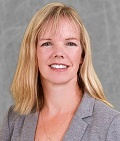 |
|
Erin Baker Ph.D.
Erin is an Associate Professor at University of North Carolina at Chapel Hill. To date, she has published over 200 peer-reviewed papers utilizing ion mobility spectrometry in conjunction with mass spectrometry (IMS-MS), studying both environmental and biological systems. Erin has served on the ASMS Board of Directors as the Member at Large for Education and is currently serving as the Vice President for Education of the International Lipidomics Society. The Baker research group utilizes advanced separations, multi-omic analyses and big data assessments to drive innovative mass spectrometry technologies, systems biology evaluations, novel software capabilities and connections between human health and the environment.
|
 |
|
Katelyn Brusach
Katelyn is a PhD candidate in the Searle Lab at The Ohio State University. Prior to starting her PhD, she obtained her bachelor’s degree in Biochemistry and Molecular Biology from Michigan State University. Her current research focuses on biomarkers of chronic kidney disease in cats, using both discovery and targeted approaches. She has utilized Skyline to assess and develop targeted proteomics assays in urine, plasma, and serum. |
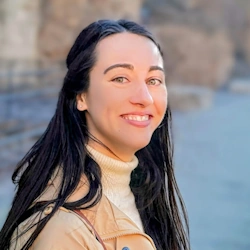 |
|
Abigail Burrows Franco, Ph.D., specializes in mass spectrometry and proteomics. She has a
comprehensive understanding of the most recent advancements and technologies in mass
spectrometry instrumentation, methodologies, and data analysis techniques. She has vast
experience in untargeted and targeted proteomics method development. Additionally, Dr.
Burrows-Franco maintains numerous on-going collaborations with industry and academic
experts. Dr. Burrows-Franco specializes in protein biomarker detection in serum and has an
extensive background in navigating protein detection in complex matrices. She also has a
strong interest in the application of quantitative proteomics, particularly for challenging matrices.
Her work utilizes state-of-the-art mass spectrometry instrumentation and methodologies, as well
as sophisticated data analyses to identify and quantify specific biomarkers, contributing to the
broader landscape of diagnostic and therapeutic developments.
|
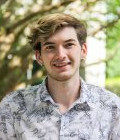 |
|
Michael Davern
Michael is a graduate Ph.D. student in Dr. Jason Surratt’s lab at the University of North Carolina at Chapel Hill. He received his Bachelor's in Chemistry from Wake Forest University. Currently, his research focuses on developing analytical methods for quantitative outdoor atmospheric Per- and Polyfluoroaklyl substance (PFAS) analysis, employing the use of Chemical Ionization Mass Spectrometry. (CIMS) His goal is to achieve lower detection limits and establish real-time methods for atmospheric measurements. |
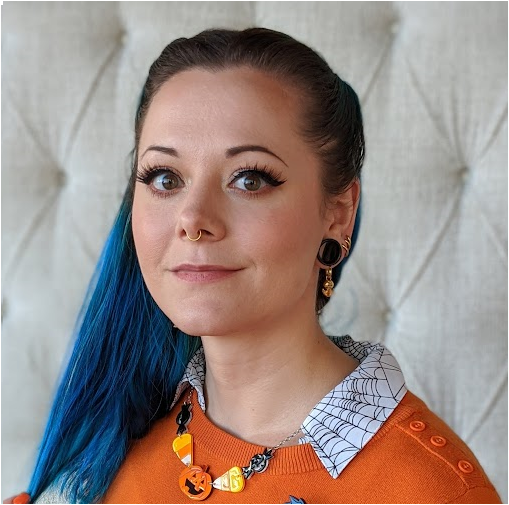 |
|
Kat Forrest
Kat Forrest is a research scientist and graduate student in the Hoofnagle Laboratory at the University of Washington. Prior to joining UW, Kat worked as an analytical chemist at Boston-based synthetic biology company Ginkgo Bioworks, where she helped to develop quantitative methods to support bioengineering projects. In her current role in the Hoofnagle Lab, Kat regularly utilizes Skyline in her efforts to develop mass spectrometry assays for small molecules and proteins. |
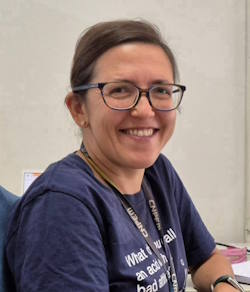
|
|
Daniela Granato, Ph.D.
Dr. Daniela C. Granato graduated in Dentistry from São Paulo State University Júlio de Mesquita Filho (2002) and obtained her PhD from the University of São Paulo in 2008, followed by postdoctoral research at the University of Massachusetts until 2011. In 2011, she began her postdoctoral research at the National Laboratory of Biosciences (LNBio-CNPEM), under the supervision of Dr. Adriana Franco Paes Leme and is currently an assistant researcher at LNBio, in Dr. Adriana's group. Her interests include Mass Spectrometry-Based Proteomics applied to oral cancer biology, with a focus on the identification and validation of molecular targets for the diagnosis and prognosis of the disease.
|
 |
|
Alessio Di Ianni
Alessio is a PhD student in Prof. Dr. Andrea Sinz´s lab at the Center of Structural Mass Spectrometry (Martin Luther University Halle-Wittenberg , Germany). His research for the first half of his PhD focused on the characterization of the full-length wild-type human tumor suppressor p53 and the role of its disordered C-terminal domain in DNA binding by means of structural mass spectrometry (MS) techniques (covalent labeling-MS, cross-linking/MS). In the second half of his PhD, he is currently developing novel trifunctional MS-cleavable chemical cross-linkers for proteome-wide cross-linking/MS applications. |
 |
|
Haley Jostes is a Ph.D. Candidate in Dr. Erin Baker's lab at the University of North Carolina at Chapel Hill. Her research focuses on utilizing multidimensional separation techniques (including liquid chromatography, ion mobility spectrometry, and mass spectrometry) to characterize how chemical and environmental exposures impact human health. Her current research efforts center around developing effective extraction and analysis methods for extracellular vesicles isolated from biological fluids.
|
 |
|
Britt Lee
My experiences from my graduate work, postdoc and industry are all focused in the small molecule and multiomics space, specializing in metabolomics, lipidomics, and proteomics. Now at Thermo Fisher Scientific, I focus on developing applications that advance omics research using cutting-edge mass spectrometry technologies. My work aims to bridge the gap between emerging analytical tools and practical solutions for high-throughput, high-precision biomolecular analysis. |
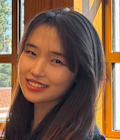 |
|
Jihyeon Lee , Ph.D.
Dr. Jihyeon Lee is a postdoctoral scientist in Dr. Jennifer Van Eyk's lab at the Smidt Heart Institute, Cedars-Sinai Medical Center. She earned her Ph.D. from Seoul National University under the mentorship of Dr. Youngsoo Kim, where her research focused on advancing automated sample preparation for multiplexing, optimizing data acquisition, and developing targeted quantitative assays for multiple biomarker candidates. Dr. Lee has extensive hands-on experience with LC-MS/MS technologies for shotgun and quantitative proteomics. Since joining Dr. Van Eyk’s lab in 2023, her research has centered on discovering and developing targeted assays for biomarkers associated with sudden cardiac arrest. Jihyeon’s current interest lays in harnessing the latest advancements in data acquisition for quantitative MS-based proteomics to enhance the understanding of protein heterogeneity at the single-cell level. She aims to push the boundaries of proteomic analysis, enabling more precise and detailed insights into cellular protein variations. |
 |
|
Camille Lombard, Ph.D.
Cam obtained her PhD from the George Washington University under Prof. Nemes.
There, she developed new proteomic approaches to characterize single cells in developing frog
embryos. She followed Prof. Nemes to the University of Maryland as a Postdoc (1 year) and then
moved on to be a NRC postdoctoral fellow at the National Institute of Standards and Technology
(NIST). At NIST, Cam developed DIA approaches to characterize CAR-T cell therapies. Now, she is an
Assoc. Director at AstraZeneca in the Cancer Biomarker Development team in early oncology. Her
current work focuses on developing targeted assays (PRM) to characterize the proteome of patient’s
tumor tissues in clinical trial cohorts.
|
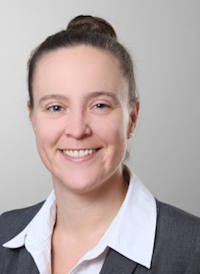 |
|
Julia Mergner, Ph.D.
Julia is heading the proteomics department at the Bavarian Center for
Biomolecular Mass Spectrometry (BayBioMS@MRI) at the TUM Klinikum in Munich. Julia
began using Skyline for PRM assay development and data visualization of phosphoisomeric
peptides during her Postdoc in the group of Professor Bernhard Küster at the Technical
University of Munich. Her current research focuses on technical developments for cancer
proteomics and immune cell populations.
|
 |
|
Gary Patti, Ph.D. is the Michael and Tana Powell Professor at Washington University in St. Louis, where he holds appointments in the departments of chemistry, genetics, and medicine. Dr. Patti is the Senior Director of the Center for Mass Spectrometry & Metabolic Tracing, Director of the Clinical Research Core in Medicine, Dean's Fellow of Advancement and Entrepreneurship, Director of Faculty Affairs, and the Chief Scientific Officer and Co-Founder of Panome Bio. Professor Patti’s research focuses on developing and applying mass spectrometry-based technologies to enhance our understanding of human diseases. Professor Patti has been recognized with numerous honors including the Biemann Medal from the American Society for Mass Spectrometry, the Midwest Award from ACS, the Innovation Award from the Academy of Science, and an inaugural NIEHS award for revolutionizing, innovative, and visionary environmental health research.
|
 |
|
Lindsay K. Pino, Ph.D.
Lindsay is the co-founder and chief technology officer at Talus Bio. With over a decade’s experience in analytical chemistry and computational biology, she develops technologies for quantitative proteomics. In particular, at Talus, she's working on the challenges associated with scaling-up quantitative proteomics experiments for drug discovery. She has been involved in a large variety of research projects spanning cancer drug discovery, molecular mechanisms of aging, epigenetics, and spatiotemporal proteomics. |
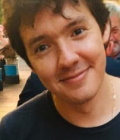 |
|
Juan Camilo Rojas Echeverri, Ph.D.
Juan obtained his Ph.D. from the University of Leipzig, Germany
under Prof. Ralf Hoffmann, focusing on developing mass spectrometry methods for the in vivo
detection carbonylation PTMs in human plasma/serum. Juan is a dedicated mass spectrometry
scientist who specializes in developing high-throughput methodologies for bottom-up
proteomics. His expertise lies in tackling complex analytical challenges, particularly in the
detection of low-abundant species, such as post-translational modifications (PTMs) and
cross-linked peptides to support structural proteomics projects. Currently he works at the Leiden
University Medical Center and is focused in developing quantitative glycoproteomics workflows
to further elucidate the meaning of the complex glycoproteome in our bodies.” What truly drives
Juan is the versatility of mass spectrometry. He thrives in collaborative environments, providing
support at every stage of the workflow—from sample preparation design to data acquisition and
analysis. His goal? Helping researchers unlock deeper biological insights through cutting-edge
MS technologies.
|
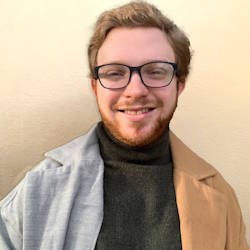 |
|
Thomas Shoff is a Neuroscience PhD candidate in Ryan Julian's lab at the University of
California Riverside. He earned a dual Bachelor's of Science in Neuroscience and
Pharmacology from UC San Diego where he contributed to research on mouse models of
neurodegenerative disease. In the Julian Lab, Thomas collects and analyzes both
data-independent acquisition and parallel reaction monitoring data using Skyline to identify and
quantitate amino acid isomerization and other post-translational modifications in human tissues,
including eye lens and brain. He has also utilized top-down mass spectrometry to glean
structural information about intact proteins in the gas phase, and recently has begun applying
radical-initiated photodissociation techniques to study disease-relevant proteins. With these
techniques, Thomas strives to deepen understanding in the mechanisms of aging,
neurodegeneration, and proteostasis collapse.
|
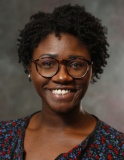 |
|
Ariana Shannon, Ph.D. Ariana is a recent graduate from the Hummon Research Group at the Ohio State University. Since graduating, she has started a postdoc with Brian Searle where she uses quantitative proteomics to analyze immuno-oncology based tumor models. She began using Skyline in her graduate studies as a way to visualize chromatograms for cell culture based 3D tumor models. More recently she uses the software to assess targeted proteomics assays for various populations of immune cells. |
 |
|
Emmajay Sutherland
Emmajay is a postdoctoral fellow in the Riley lab at the University of Washington. She completed her PhD in the Czekster lab at the University of St Andrews, Scotland where she used Skyline for metabolomics-based projects. Her current research with Professor Nick Riley is now focused on creating methods to target the glycoproteome for clinical applications. |























